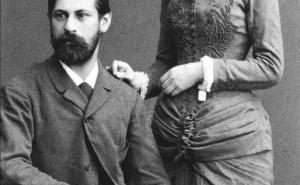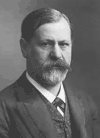随着个体的成长,从父母的权威中获得解放,成为其成长过程带来的最为必然却也最为痛苦的结果之一。极为必要的的是“那种解放应当发生”,同时它可能被假定为在某种程度上已经被抵达正常状态的每个人所完成。确实,社会的整体进步取决于相继代际间的对立。另一方面,存在一类患者,其状况可被识别为由这种解放任务的失败所决定。
首先,对于一个小孩,他的父母是唯一的权威,也是其整个依赖的源泉。在其生命的早年,这个孩子的最为强烈且最为重要的愿望就是像他的父母一样(父母中同性的一方),就是大到像父亲和母亲那样。但是随着理智的增强,孩子禁不住地逐渐发现他的父母所属的类别。他开始知道其他人的父母并将他们与自己的父母对比,也因此获得权利去怀疑他曾认为属于其父母的不可比拟的独特品质。在孩子生命中令他感到不满意的小事情给予他以刺激,以便开始批评他的父母,并使用他已掌握的关于其他人的父母在某些方面胜于自己父母的认识来支撑其批评的态度。神经症的心理学教会我们在其他诸多因素中最为强烈的性竞争促成这种结果。一种被轻视的感情显然构成了这样的刺激之创作题材。不过存在着太多的时刻会使一个孩子被轻视,或者至少会让他感觉已被轻视,会使他感到没有得到父母爱的全部,尤其因不得不与兄弟姐妹分享它而感到痛惜。于是,这种自身的爱未得到充分回报的感受,在“自己是继亲孩子或被领养的孩子”的想法中找到发泄口。后来这样的想法常常可从童年早期中有意识地回想起来。没有发展成神经症的人也会非常频繁性地记得这样的时刻,在其中——通常作为他们读过的一些东西的结果——他们以这样的方式解释父母的敌意行为并对之做出反应。然而性的影响在这里已经十分明显,比如对于一个男孩,相比于朝向母亲的敌意冲动,他更多地倾向于感受到指向父亲的敌意冲动,也具有比远离母亲要强烈得多的远离父亲的欲望。而女孩对这方面的想象要显得弱得多。这些意识性地被回想起的童年精神冲动包含了这种使我们能够理解‘神话之本质’的因素。
在神经症与父母疏远的发展中,其后期阶段通过可被表述为“神经症的家庭罗曼史”的方式开始。它很少意识性地被回忆起,但几乎总能被揭露。因为一种特别显著的想象性活动是神经症的同时也是所有相比之下具有高天赋的人的基本特征之一。这种活动首先出现于游戏中,之后大致上从之前开始以家庭作为主题。这种独特想象活动的一个典型例子可见于常见的白日梦中,这种白日梦在青春期以后仍能长久地存留。如果仔细地检查这些白日梦,那么能够发现它们起着实现欲望和修正当下生活的作用。它们具有两种主要的目的,即色欲目的和野心目的——尽管一个色欲目的通常可隐藏于后者之中。之后,大约在我已提及的那个时期,孩子的想象转变为忙于远离令他反感的父母的任务中,忙于用通常具有更高社会地位的他人来替代父母的任务中。在这方面他将利用源自于其实际经验中的任何符合适宜的巧合,比如他所熟悉的庄园领主或某个土地所有者(如果他生活在乡村)、或者是他所认识的某个贵族成员(倘若他生活在城镇)。这些被运用于发展此类(当然在这个时期是意识性的)幻想的技术取决于孩子的独创性以及可供他支配的素材。此外还存在是否这类幻想会通过或多或或少的努力来获得可能性的问题。这一阶段在孩子仍不知晓生育中的性别决定因素时得以达成。
当孩子一觉察到在性关系中父亲和母亲所起作用间的差异并认识到“父亲总是不确定的,而母亲总是确定的”时,家庭罗曼史经历了一种有趣的删节:它满足于擢升孩子的父亲,但是不再怀疑他的母系血统,因为这被看成是不可更改的事。家庭罗曼史的第二(性)阶段也被其他动机所驱使,而这在第一(性)阶段是不存在的。孩子在了解了性过程之后倾向于想象色欲情境及关系,而在这背后的动力正是他要将他的母亲(她是最为强烈的性好奇心的对象)带入秘密的不忠和隐秘的不正当男女关系的状况中。从之前的无性幻想出发,孩子的幻想通过这种方式驶近他后来的知识水平。
此外处在早期阶段最突出位置中的报复和反击的动机,亦可发现于后期阶段中。一般来说,正是这些曾因性顽皮而被父母惩罚的神经症儿童现在通过此类幻想来为自己报复父母。
一个更为年幼的小孩特别倾向于运用这些富于想象力的故事来剥夺先于他出生的孩子们所拥有的特权——以一种使人想起历史阴谋的方式;而且他经常毫不犹豫地把和他拥有的竞争者数目一样多的虚构性的不正当男女关系归于他的母亲。家庭罗曼史的一种有趣变体可能于之后出现,在这种变体中,英雄和作者在其兄弟姐妹由于被判定为私生子而被消除的同时返回到证明自身的合法性。假使还有任何其他特定的利害关系活跃着,那么他同样可以将其过程导入家庭罗曼史所钟爱的范畴;由于其多面性和宽泛的适用性,使它能够满足每一种要求。例如,以这样的方法,如果他发现在性方面被自己一个姐妹所吸引,那么这个年轻的幻想建立者就可以用她来摆脱被禁止的亲属关系等级。
倘若任何人倾向于在惊恐中对孩子心中的这种邪恶感到厌恶,或者甚至想去质疑这类事情的可能性,那么他应当注意到这些看上去如此富于敌意的虚构性作品当中的任何一部实际上都不是那样恶劣地有意为之,他也应当留意到它们在一种轻微的伪装下仍保留着孩子对其父母的原初感情。这种不贞和忘恩负义只是表面上的。如果我们详细地检查这些想象的罗曼史的共同点,即用更伟大的人来替代父母或只替代父亲,那么我们会发现这些新的、贵族式的父母具备着全然起源于关乎实际的且低微的父母之真实;所以事实上孩子不是除去了他的父亲而是擢升了他。确实,使用更出色的父亲来替代真正父亲的整个尝试仅是孩子表达对已消逝的岁月之渴望的一种方法,在那样的欢乐岁月里,他的父亲对他而言曾是最高贵且最强大的男人,而他的母亲则是最亲爱的和最美丽的女人。他正避开如今他所认识的父亲,而进入在童年时光里他所认为的父亲;并且他的幻想不过是表达由幸福时光已逝所引起的惋惜。因此在这些幻想中以孩子早年时代为特征的过高估计如今再次到来。梦的研究给这个主题带来一种值得关注的贡献。从他们的解释中我们获悉,纵然是在后来的岁月中,如果皇帝和皇后出现于梦中,那么这些尊贵的人物代表着梦者的父亲与母亲。因此孩子对父母的过高估计仍残存于正常成人的梦里。
Sigmund Freud, ‘Family Romances’ (1909)Source:The Penguin Freud Library, ed. Angela Richards, et al., Vol. 7: On Sexuality -Three Essays on the Theory of Sexuality and Other Works, [trans. from the German under the gen. editorship of James Strachey, pp.217-56; prev. printed inThe Standard Edition of the Complete Psychological Works,Vol. VII (London: Hogarth Press 1953 & Edns.).].
The liberation of an individual, as he grows up, from the authority of his parents is one of the most necessary though one of the most painful results brought about by the course of his development. It is quite essential that that liberation should occur and it may be presumed that it has been to some extent achieved by everyone who has reached a normal state. Indeed, the whole progress of society rests upon the opposition between successive generations. On the other hand, there is a class of neurotics whose condition is recognizably determined by their having failed in this task.
For a small child his parents are at first the only authority and the source of all belief. The child’s most intense and most momentous wish during these early years is to be like his parents (that is, the parent of his own sex) and to be big like his father and mother. But as intellectual growth increases, the child cannot help discovering by degrees the category to which his parents belong. He gets to know other parents and compares them with his own, and so acquires the right to dodbt the incomparable and unique quality which he had attributed to them. Small events in the child’s life which make him feel dissatisfied afford him provocation for beginning to criticize his parents, and for using, in order to support his critical attitude, the knowledge which he has acquired that other parents are in some respects preferable to them. The psychology of the neuroses teaches us that, among other factors, the most intense impulses of sexual rivalry contribute to this result. A feeling of being slighted is obviously what constitutes the subject-matter of such provocations. There are only too many occasions on which a child is slighted, or at least feels he has been slighted, on which he feels he is not receiving the whole of his parents’ love, and, most of all, on {221} which he feels regrets at having to share it with brothers and sisters. His sense that his own affection is not being fully reciprocated then finds a vent in the idea, often consciously recollected later from early childhood, of being a step-child or an adopted child. People who have not developed neuroses very frequently remember such occasions, on which - usually as a result of something they have read - they interpreted and responded to their parent’s hostile behaviour in this fashion. But here the influence of sex is already in evidence, for a boy is far more inclined to feel hostile impulses towards his father than towards his mother and has a far more intense desire to get free fromhimthan fromher. In this respect the imagination of-girls is apt to show itself much weaker. These consciously remembered mental impulses of childhood embody the factor which enables us to understand the nature of myths.
The later stage in the development of the neurotic’s estrangement from his parents, begun in this manner, might be described as “the neurotic’s family romance’. It is seldom remembered consciously but can almost always be revealed by psychoanalysis. For a quite peculiarly marked imaginative activity is one of the essential characteristics of neurotics and also of all comparatively highly gifted people. This activity emerges first in children’s play, and then, starting roughly from the period before puberty, takes over the topic of family relations. A characteristic example of this peculiar imaginative activity is to be seen in the familiar day-dreaming [] which persists far beyond puberty. If these day-dreams are carefully examined, they are found to serve as the fulfilment of wishes and as a correction of actual life. They have two principal aims, an erotic and an ambitious one - though an erotic aim is usually concealed behind the latter too. At about the period I have mentioned, then, the child’s imagination becomes engaged in the task of getting free from the parents of whom {223} he now has a low opinion and of replacing them by others, who, as a rule, are of higher social standing. He will make use in this connection of any opportune coincidences from his actual experience, such as his becoming acquainted with the Lord of the Manor or some landed proprietor if he lives in the country or with some member of the aristocracy if he lives in town. Chance occurrences of this kind arouse the child’s envy, which finds expression in a phantasy in which both his parents are replaced by others of better birth. The technique used in developing phantasies like this (which are, of course, conscious at this period) depends upon the ingenuity and the material which the child has at his disposal. There is also the question of whether the phantasies are worked out with greater or less effort to obtain verisimilitude. This stage is reached at a time at which the child is still in ignorance of the sexual determinants of procreation.
When presently the child comes to know the difference in the parts played by fathers and mothers in their sexual relations, and realizes that “pater semper incertus est”, while the mother is “certissima”, [] the family romance undergoes a curious curtailment: it contents itself with exalting the child’s father, but no longer casts any doubts on his maternal origin, which is regarded as something unalterable. This second (sexual) stage of the family romance is actuated by another motive as well, which is absent in the first (asexual) stage. The child, having learnt about sexual processes, tends to picture to himself erotic situations and relations, the motive force behind this being his desire to bring his mother (who is the subject of the most intense sexual curiosity) into situations of secret infidelity and into secret love-affairs.’ In this way the child’s phantasies, which started by being, as it were, asexual, are brought up to the level of his later knowledge. {224}
Moreover the motive of revenge and retaliation, which was in the foreground at the earlier stage, is also to be found at the, later one. It is, as a rule, precisely these neurotic children who were punished by their parents for sexual naughtiness and who now revenge themselves on their parents by means of phantasies of this kind.
A younger child is very specially inclined to use imaginative stories such as these in order to rob those born before him of their prerogatives - in a way which reminds one of historical intrigues; and be often has no hesitation in attributing to his mother as many fictitious love-affairs as he himself has competitors. An interesting variant of the family romance may then appear, in which the hero and author returns to legitimacy himself while his brothers and sisters are eliminated by being bastardized. So too if there are any other particular interests at work they can direct the course to be taken by the family romance; for its many-sidedness and its great range of applicability enable it to meet every sort of requirement. In this way, for instance, the young phantasy-builder can get rid of his forbidden degree of kinship with one of his sisters if he finds himself sexually attracted by her.
If anyone is inclined to turn away in horror from this depravity of the childish heart or feels tempted, indeed, to dispute the possibility of such things, he should observe that these works of fiction, which seem so full of hostility, are none of them really so badly intended, and that they still preserve, under a slight disguise, the child’s original affection for his parents. The faithlessness and ingratitude are only apparent. If we examine in detail the commonest of these imaginative romances, the replacement of both parents or of the father alone by grander people, we find that these new and aristocratic parents are equipped with attributes that are derived entirely from real recollections of the actual and humble ones; so that in fact the child is not getting rid of his father but exalting him. Indeed the whole effort at replacing the real father by a superior one is only an expression of the {225} child’s longing for the happy, vanished days when his father seemed to him the noblest and strongest of men and his mother the dearest and loveliest of women. He is turning away from the father whom he knows today to the father in whom he believed in the earlier years of his childhood; and his phantasy is no more than the expression of a regret that those happy days have gone. Thus in these phantasies the overvaluation that characterizes a child’s earliest years comes into its own again. An interesting contribution to this subject is afforded by the study of dreams. We learn from their interpretation that even in later years, if the Emperor and Empress appear in dreams, those exalted personages stand for the dreamer’s father and mother’s, So that the child’s overvaluation of his parents survives as well in the dreams of normal adults. []
Notes
1. Cf. “Hysterical Phantasies and their Relation to Bisexuality’ [1909a], where a reference will be found to the literature of the subject [P.F.L., 10, 87].
2. An old legal tag: “paternity is always uncertain, maternity is most certain”.
3. Freud returned to this in the first of his papers on the psychology of love (1910h), pp. 238-89 below.
4. Cf. myInterpretation of Dreams(1900a),P.F.L., 4, 470.



